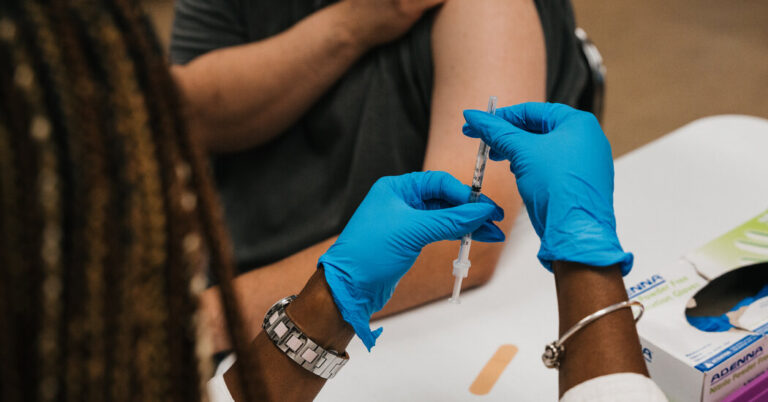Americans could receive the next Covid shots on Wednesday, the latest in a trifecta of vaccines intended to prevent respiratory infections this fall and winter.
On Monday, the Food and Drug Administration approved updated Covid vaccines by Pfizer and Moderna. A scientific advisory committee at the Centers for Disease Control and Prevention will meet on Tuesday to review the data and make more specific recommendations about who should get the injections and when.
“I hope they go out and recommend it for everyone,” said Dr. Ashish Jha, dean of the Brown University School of Public Health, who served as the White House’s Covid czar until June.
Big pharmacies will likely have the vaccines on offer later this week, assuming Dr. Mandy Cohen, the new CDC director, signed off on the recommendations.
For some Americans, vaccines can’t come soon enough. Hospital admissions and deaths related to Covid have been rising steadily since July, although the numbers are still low compared to the same period in previous years.
But many others now view Covid as only a mild threat. Less than half of adults older than 65, and nearly one in five American adults overall, opted for the bivalent booster shot offered last fall.
Vaccines against influenza and respiratory syncytial virus are now available. The flu vaccine is recommended for everyone 6 months and older, and the RSV vaccine for everyone 60 and older, in consultation with a health care provider.
The most vulnerable – the elderly, immunocompromised people and pregnant women – should receive both the Covid and flu vaccines, experts say.
Adults 65 and older account for up to 85 percent of flu-related deaths in recent years, according to the CDC Those 75 and older also account for the majority of hospitalizations and deaths from Covid.
CDC advisers will have to decide whether to recommend the new Covid vaccines for younger people who have developed strong immunity through previous shots or infections. (The FDA has approved the shots for almost everyone, but the CDC makes recommendations on clinical use.)
Officials in Britain are only offering the new Covid vaccines to those at high risk, including the elderly, those with chronic medical conditions and frontline workers. But that decision was made not because of a calculation about who would benefit the most, but because of the prohibitive costs to the British government of offering the shots to everyone, Dr. Yes.
As with the flu vaccine, the greatest benefits of the Covid vaccination may accrue to those at highest risk. Still, the shots may help even those at reduced risk recover sooner after an infection, or miss fewer days of work, Dr. Yes.
And even in the relatively young and healthy, Covid poses risks that are harder to define, including long-term effects on the heart and long Covid. “I don’t want to minimize the tragedy of younger people who may be hospitalized,” said Gigi Gronvall, a biosecurity expert at the Johns Hopkins Center for Health Security.
The shots are available for free to most Americans through private insurers and through a new one federal program for uninsured people.
